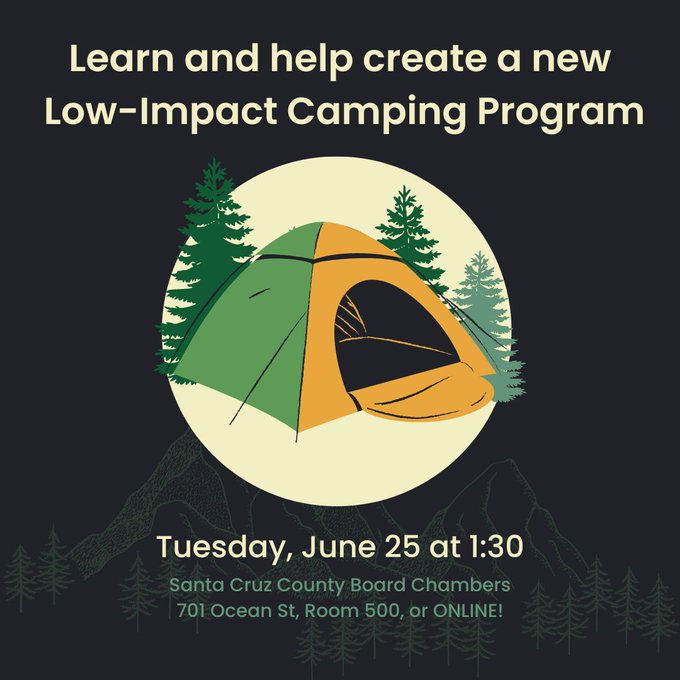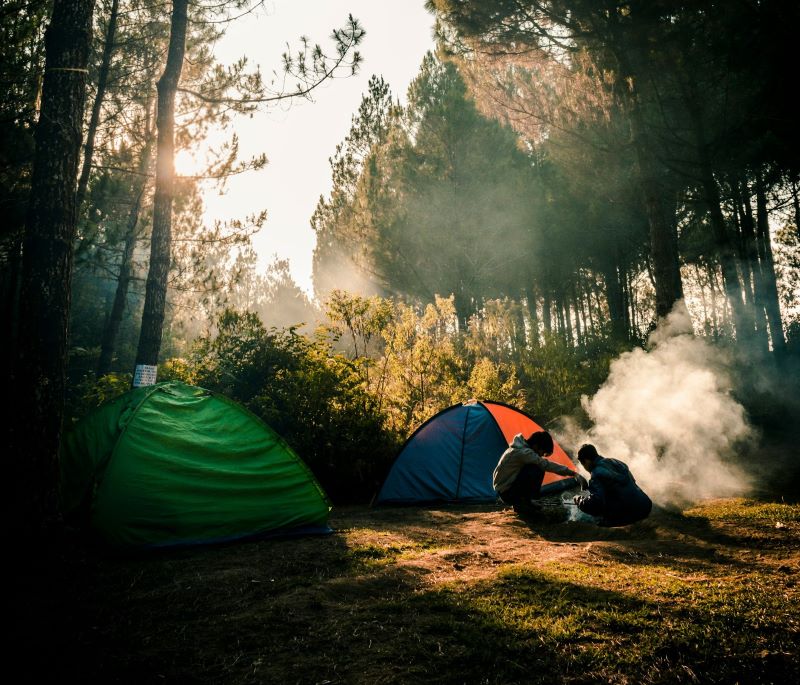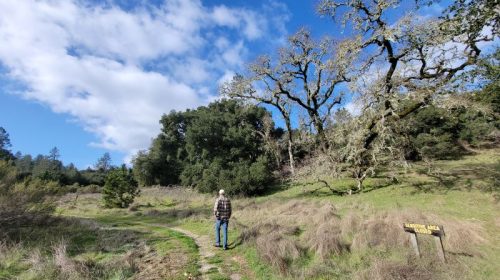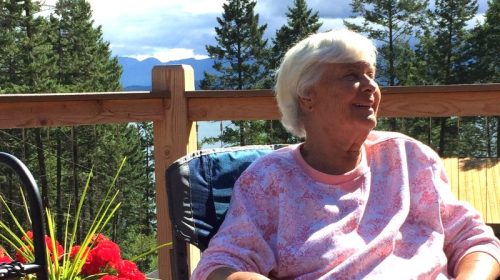Low Impact Camping Ordinance
UPDATE: Supervisor Zach Friend’s controversial “Low-Impact Camping Ordinance” was rejected at today’s county Board of Supervisors meeting. Supervisors Manu Koenig, Justin Cummings, Felipe Hernandez, and Bruce McPherson instead urged waiting for the result of Senate Bill 620 – the state’s camping ordinance, guidance from the insurance commissioner on impact to insured homeowners, and input from stakeholders. The final vote was unanimous.
The Bonny Doon turnout was particularly strong thanks to 3rd District Supervisor Justin Cummings who connected with leaders in his district to advise them of the planned ordinance in advance and to garner feedback.
***
On Tuesday, June 25 the Santa Cruz County Board of Supervisors considered a Low-Impact Camping Ordinance. Read the proposal here and the draft ordinance here. County officials created a marketing campaign around the program in advance of the supervisor’s meeting:

Key Points of the Proposed Camping Ordinance
– Property owners will be able to apply for permits to rent campsites on parcels of 5 acres or larger outside the Urban and Rural Services Lines.
– Each parcel can have one LICA (low impact camping area), hosting up to 9 campsites with a maximum of 4 campers per campsite (as many as 36 per night).
– Establishes operational standards like noise control, parking, and waste disposal.
– Approximately 1,300 eligible parcels exist in Santa Cruz County.
Residents, fire chiefs, and planning commissioners have expressed concern about fire hazard going into fire season, lack of on-site management in the event of an emergency or other campsite issues, and impact to sensitive habitat. The Santa Cruz Sentinel’s editorial board posted its opposition stating, “The LICA ordinance, while well meaning, is poorly timed and inappropriate for an area still reeling from 2020’s fires.”
Proponents of the camping ordinance cite Transient Occupancy Tax (TOT) revenue for the County, increased revenue for landowners generating income by renting out campsites, and enhanced camping opportunities for visitors to the area.
Communications to the Planning Commission and Board of Directors
Boulder Creek Fire Chief Mark Bingham’s letter to the Planning Commission
Zayante Fire Chief Jeff Maxwell’s letter to the Planning Commission
Planning Commission’s Recommendations
Santa Cruz County Planning Commission list of recommendations
● Recommend that the proposed ordinance allow issuing LICA permits in approved zone districts only for owner-occupied, improved properties with legal access, whether they have cell service or not: It is critical that issues on-site, in the neighborhood, or during critical or medical emergencies can be addressed and it is reality that in much of the rural and mountainous parts of our county, while cell service may certainly exist, it is notoriously unreliable and frequently unavailable, especially during weather and fire emergencies. Having responsible local parties on site is critical to the success of this ordinance, given our recent history of fires, floods, and landslides.
● Recommend that the Board bifurcate this ordinance and consider a “stand-alone” Farm Stay ordinance separate from the proposed Local Impact Camping: there are many small and organic farms in the county that are already visitor serving infrastructure with farm stands, etc., and many have sanitary facilities, public areas and water available, as well as on-site live-in supervision, good legal access, adequate roads and established parking. Thus many farms could host camping with relatively little change in their operations or effect on their neighbors and would have much wider acceptance in the community.
● Recommend that the Board direct Planning to determine and map just how many parcels of record would be eligible for Low Impact Camping sites.
● Recommend that the Board carefully consider how the provisions of the ordinance can be enforced if there are problems for the neighbors or in an emergency since the County Sheriff’s personnel stretched critically thin in the rural and mountain areas. Currently, law enforcement capability in the Santa Cruz Mountains is limited.
● Recommend that the Board consider not moving forward to enact a Low Impact Camping Ordinance at the current time until a state ordinance is approved and signed at the state level. This will avoid unnecessary, lengthy and costly revisions to a pre-existing local ordinance.
● Recommend that the Board require Planning to clearly determine and map how many parcels are eligible in the zones that are proposed to allow Low Impact Camping and where they are located. It is important that both staff and the public clearly understand how many and where these parcels are located.
● Recommend that the Board consider removing Residential Agricultural from zones where low Impact camping is permitted. If Residential Agricultural zones stay in the ordinance, limit the number of campers allowed because of noise intrusion upon adjacent neighbors. Note that in the mountainous and rural areas of the county where many RA parcels may be 5 acres or bigger, the usable areas where homes and activities are located are usually adjacent to their neighbors homes and property. This prevents real problems concerning hours, noise, dogs, etc. and enforcement if low Impact camping is allowed. Simply applying the 60 dB noise ordinance will not suffice.
● Recommend not allowing undeveloped TPZ parcels to have Low Impact Camping unless the TPC zone parcel has a approved legal residence with a resident owner/manager. Many TPZ parcels are in isolated areas that are very rural, have difficult access, and no improvements. It makes no sense and is a real safety and fire concern to allow camping on them.
● Recommend Special Use and Open Space zoned parcels should be carefully scrutinized to determine if they are appropriate for low Impact camping before being included because of terrain, access, fire danger, etc.
● Recommend removing all PR zones from any Low Impact Camping ordinance: the County Parks department should have jurisdiction over camping in the parks and many of the parks have established master plans which determine appropriate development. Low Impact camping in many of the parks will interfere with ongoing scheduled activities and plans.
● Recommend the Board instruct planning to hold minimum of 2 public meetings so the public can become acquainted with the proposed ordinance and give feedback to the board, especially in residential agricultural zones. While there has been a stakeholder meeting, and the usual public notices, it is clear that the vast majority of residents in areas where Low Impact Camping is considered know nothing about this proposed ordinance. It is very important that the Board hear fom them and they are able to give their feedback on what is proposed. This ordinance will have significant impacts in many neighborhoods and the public needs to be heard from.
● Per the letter from the Fire Chiefs, recommend the Board specify critical standards for hearings to fire code 7.92.505.2. as to signage; 307.4.24 recreational fire standards.
● Recommend that the Board limit Low Impact Camping in all permitted zones only in parcels outside: BOTH Very High and High Fire Hazard areas and identified environmentally sensitive areas: these High and Very High Fire areas should be clearly identified and mapped to allow clear delineation of approved areas for low Impact camping permits both with the public and staff. While this exclusion may limit the number of properties available for Low Impact Camping, it is necessary for the board to protect the current residents of the county given our recent experience of fires quickly getting out of hand, especially the rural areas. Also see letter from The Fire Chiefs Association which endorses this.
● Recommend that the Board consider that by allowing canvas tents, yurts and domes in combination with recreational vehicles for stays up to 2 weeks without any mechanism for ensuring that this is the length of stay, these accommodations can easily drift from transitory to permanent. These structures also contribute to fire load without improve fire protection resources. The Board should consider some mechanism for making sure rules for how many people and how long they can stay can be enforced and that the ordinance has clear language for enforcement and clear penalties.
● Recommend the Board includes language that clearly prohibits campfires and fires of any kind in all circumstances on low Impact camping sites. Tying together the ordinance provisions with “burn days” is irrelevant, because by definition “burn days” are designated for when residents, with an obtainable permit, can burn trash or brush on their property between specified dates. Burn days are not related in any way to timing or permitting fires or cooking involved with camping. Clearly, given our recent history, fire danger in rural and forested areas should be of first and critical consideration.
● Recommend that the Board explore the effect that having camping on adjacent properties will affect the availability and cost of fire insurance for nearby properties and if it will even be available to those who wish to apply for a Low Impact Camping permit. We all know that all major insurers are very leery of providing fire insurance to homes in fire prone areas. All applicants should be aware of this issue and show they are able to get insurance.
● Recommend the Board direct Planning to investigate Low Impact Camping ordinances and outcomes in other counties which have passed similar ordinances.
Action
1. Contact the Board of Supervisors to express your perspective:
– Email: BoardOfSupervisors@santacruzcountyca.gov
– Call: (831) 454-2200
2. Attend the meeting:
– Date: Tuesday, June 25
– Time: 1:30 pm
– Location: County Building, Room 500, 701 Ocean St., Santa Cruz, CA 95060
– Attend online
***
Have a news item to contribute? The San Lorenzo Valley Post welcomes your Santa Cruz Mountains news, story ideas, photos, and letters. Send us an email.
Sign up for our newsletter to stay connected to news and events in the Santa Cruz Mountains.
The San Lorenzo Valley Post is your essential guide to life in the Santa Cruz Mountains. We're dedicated to delivering the latest news, events, and stories that matter to our community. From local government to schools, from environmental issues to the arts, we're committed to providing comprehensive and unbiased coverage. We believe in the power of community journalism and strive to be a platform for diverse voices.





